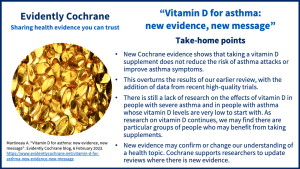In a blog for people interested in asthma management, Professor Adrian Martineau reflects on new Cochrane evidence on vitamin D and asthma and why conclusions have changed.
Take-home points

Our Cochrane Review Vitamin D for the management of asthma (published February 2023) shows that taking a vitamin D supplement does not reduce the risk of asthma attacks. Findings like this, where we discover that something doesn’t help, or isn’t linked to better health, do not always generate much interest. But in this case, the finding is intriguing because it overturns the conclusions from a similar review from a few years ago.
As a researcher who worked on both these reviews, I’ve been reflecting on why the ‘take-home message’ has changed in this case, and what this tells us about the nature of science and discovery.
Cochrane supports medical researchers from around the world to track down all the clinical trials that have been done in a certain area. This could be vitamin D and asthma, yoga and back pain or treatments for COVID. We then sift out any studies that do not meet the highest scientific standards and pull together the results from the remaining trials.
This approach offers quality control, but size also matters. Each individual trial might include a hundred patients, but by combining the results of several trials together, we can include data from thousands of participants. The more people we include, the more confident we can be that any effect we see from a supplement or treatment is real and not just happening by chance. Pooling data from multiple trials also makes it possible to detect smaller, but still clinically important, effects.
In 2016 when we reviewed research on vitamin D and asthma, we found nine high-quality clinical trials that compared asthma outcomes in a total of 1,093 people who were randomly assigned to take vitamin D or placebo. Combined, they indicated that vitamin D could reduce risk of severe asthma attacks. Since then, a lot more research has been done, so today’s review includes data from 20 high quality trials with a total of 2,225 people. Taken together, the evidence now indicates that vitamin D does not reduce the risk of asthma attacks or improve control of asthma symptoms.
Why has the picture on vitamin D and asthma changed?
Vitamin D, sometimes known as the sunshine vitamin, is still good for us in other ways. We need it to maintain strong bones and muscles, for example. But why has the picture changed in terms of vitamin D and asthma specifically?
The honest answer is that we don’t know for sure. It could be that asthma treatments have been improving, or that people have been getting better at taking them. Alternatively, background vitamin D levels among people with asthma may have improved in recent years, due to increased use of supplements or eating more foods fortified with vitamin D. Either of these factors could obscure potential benefits of people with asthma taking additional vitamin D supplements. Regardless of the reason, the results of today’s review are likely to be correct for people living with asthma today.
In our review, we explain that there’s a lack of research on the effects of vitamin D in people with severe asthma as well as in people with asthma whose vitamin D levels are extremely low to start with. As research on vitamin D continues, yielding more insights, we may find that there are particular groups of people who may benefit from taking supplements.
New research can confirm or change what we understand
That is the broader message about science that I take away from this example: the more research we do, the more knowledge we accumulate, and our understanding of the effects of different treatments grows. Often new research confirms our existing understanding of a topic, but sometimes it alters our thinking in unexpected ways.
What ‘the science’ says can and will change. Cochrane understands this and that’s why they support researchers to update reviews when new evidence emerges. In areas where evidence is coming thick and fast, for example in the case of vaping, Cochrane runs ‘living’ reviews which are updated as often as needed.
So people with asthma, their families and their doctors should know that vitamin D probably won’t reduce risk of asthma attacks, and they should focus their efforts on the medication and lifestyle choices that will reduce symptoms. Importantly, however, they should not stop taking vitamin D supplements if they have been given to protect their bone health, particularly if they have been prescribed steroid inhalers or tablets.
We should all be open to the results of new research. We should think critically about new discoveries, and where they change current understanding, we should consider whether we want to make changes in our own lives to improve our health.
Find out more
About systematic reviews
About asthma
The Cochrane Review:
Williamson A, Martineau AR, Sheikh A, Jolliffe D, Griffiths CJ. Vitamin D for the management of asthma. Cochrane Database of Systematic Reviews 2023, Issue 2. Art. No.: CD011511. DOI: 10.1002/14651858.CD011511.pub3. Accessed 06 February 2023.
Join in the conversation on Twitter with @CochraneUK or leave a comment on the blog.
Please note, we cannot give specific medical advice and do not publish comments that link to individual pages requesting donations or to commercial sites, or appear to endorse commercial products. We welcome diverse views and encourage discussion but we ask that comments are respectful and reserve the right to not publish any we consider offensive. Cochrane UK does not fact check – or endorse – readers’ comments, including any treatments mentioned.
Declaration of interest:
Adrian Ralph Martineau (ARM) declares receipt of funding in the last 36 months to support vitamin D research from the following companies who manufacture or sell vitamin D supplements: Pharma Nord Ltd, DSM Nutritional Products Ltd, Thornton & Ross Ltd and Hyphens Pharma Ltd. ARM also declares receipt of vitamin D capsules for clinical trial use from Pharma Nord Ltd, Synergy Biologics Ltd and Cytoplan Ltd; support for attending meetings from Pharma Nord Ltd and Abiogen Pharma Ltd; receipt of consultancy fees from DSM Nutritional Products Ltd and Qiagen Ltd; receipt of a speaker fee from the Linus Pauling Institute; participation on Data and Safety Monitoring Boards for the VITALITY trial (Vitamin D for Adolescents with HIV to reduce musculoskeletal morbidity and immunopathology, Pan African Clinical Trials Registry ref PACTR20200989766029) and the Trial of Vitamin D and Zinc Supplementation for Improving Treatment Outcomes Among COVID-19 Patients in India (ClinicalTrials.gov ref NCT04641195); and unpaid work as a Programme Committee member for the Vitamin D Workshop.


